
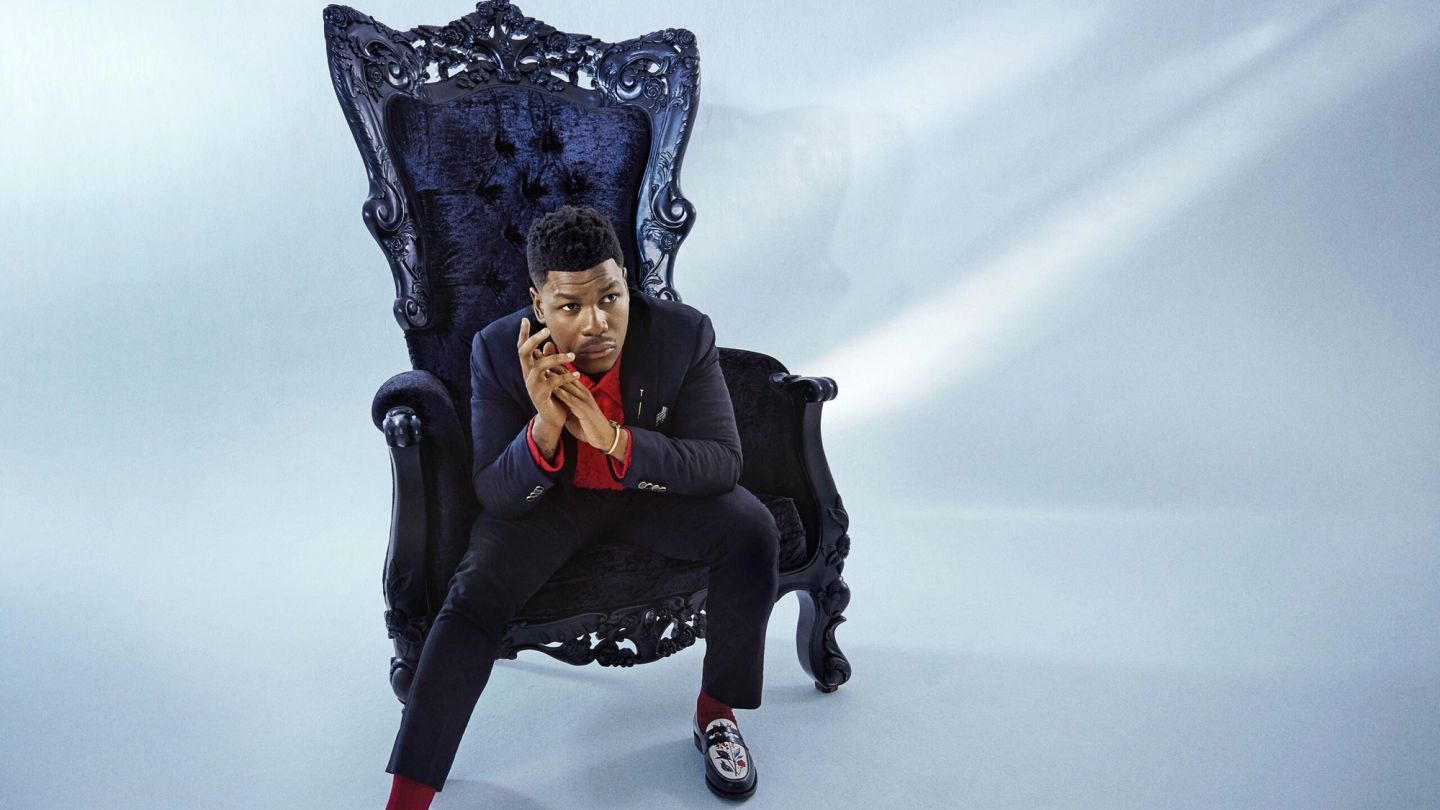
The new reign of King John
After three years, John Boyega is back on the big screen with three triumphant new films. Here's how he reclaimed his acting crown...
Words: Jonathan Wells
Photography: Tomo Brejc
Styling: Carlotta Constant
Grooming: Zakiyah Shani @ 'The Melanin Agency'
ALL HAIL! ALL RISE! Because Boyega’s back — and heavens above if he doesn’t look at home on a throne. He’s got grace, he’s got taste, and he’s got a unique, innately stately vibe about him; a kind of rare-to-find, hard-to-define energy that royally mashes up grandeur, charisma and cool.
But a bit of might and majesty is only to be expected. After all, the young British actor has spent the last decade reigning supreme over a blockbusting box office, and his triumphant return to the big screen (three fresh films released mere months apart, three years after his last: a final Star Wars adventure) has seen him reclaim his acting crown. In the third release of this second wind, he even plays a king — but more on that later.
Because today, Boyega’s busy. He’s holding court in a west London studio space, togged up in a series of refined, regal dinner jackets and finely stitched suits. And enhancing each outfit is a piece of shining armour — highly polished and carefully selected to reflect the actor’s kingly character. It’s a bold choice; stately and stylish, but also solemn. But this, again, makes sense. For, while Boyega is noble by nature, he’s ever nobler by name.
“Adegboyega,” intones the actor, lavishing weight and dignity on every softly-spoken syllable of his full surname. “It means ‘one who will be crowned’. And I think, though it does have various meanings, for me specifically, and my family, it refers to your ‘higher self’. It’s the person you’re trying to live up to, a better version of yourself. Essentially, your ‘crown’. That’s how, over the years, my family has made sense of our surname, anyway — because we’re obviously not part of any monarchy!”
Another of Boyega’s names, ‘Adedayo’, is also of Yoruba origin, and also has a majestic meaning — ‘The king became joy’. It’s almost as if his parents, in doubling down on names with regal resonance to them, were divining the fame and fortune to come. ‘John’, however, a name chosen by his father, Samson, a Pentecostal minister, thrills Boyega a little less. “My parents could have added some spice to that!”, he laughs.
Dolce & Gabbana Blazer, £2,550; Bleue Burnham Ring, £395; Hatton Labs Ring, £160
Ralph Lauren Polo, £860; Tiffany & Co Ring, £2,600
“But it’s straight up from the Bible,” nods Boyega. “At first, my dad wanted to call me Paul. For me, both options are a bit…meh. My sisters’ names are Blessing and Grace. But John? Bloody hell. When we’d meet up with other family members, us siblings would always say our names in order; ‘Blessing, Grace, John’. And I’d always think, that doesn’t sound right, does it? Goes a bit downhill after Grace…”
But biblical names have been a constant throughout Boyega’s life — and his career. In Pacific Rim: Uprising, he played a ‘Jacob’, and in the 24 sequel series, Live Another Day, he was a ‘Christopher’. Even his first film, 2011’s south London sci-fi Attack the Block (‘It’s Inner City vs. Outer Space!’, declared the tagline), saw the actor step into the less-than-saintly shoes of a gang leader named ‘Moses’. It’s been just over a decade since that breakout role (Boyega turned 30 in March — “I went to Atlanta with my boys to celebrate, and I went to party,” he says), but he’s never forgotten about the project. In fact, there’s a long-gestating sequel currently in development with original director Joe Cornish. Ten years on, where does his mind go when he hears the film’s title?
“For me? Straight to Myatt’s Fields Estate in Brixton. That’s where we filmed the first few scenes of Attack the Block. And what’s funny is, on that street, in a little flat on that very street, that’s where my mum and dad had me. So it was kind of weird and nostalgic when they were on set, saying to me: ’When we first came to the country, and then settled down for a bit and then had you, we were right here’”.
Boyega, who adds that his parents “always come to set”, still speaks fondly about his early career. After growing up in Peckham and attending Westminster City School, the actor landed his first lead performance, in Othello, while studying performing arts at South Thames College. But, while it wouldn’t be until he responded to an online casting call for Attack the Block that his screen career would start, his head was first turned towards cinema when he clocked that the black British film industry was beginning to flourish.
“I think Kidulthood was the biggest one for me,” says Boyega. “There was Bullet Boy before that, but Kidulthood was the first black British film that seemed to have a big major release in the UK. It seemed to have a marketing budget. There was this excitement around it. And a lot of people’s reviews were fantastic.
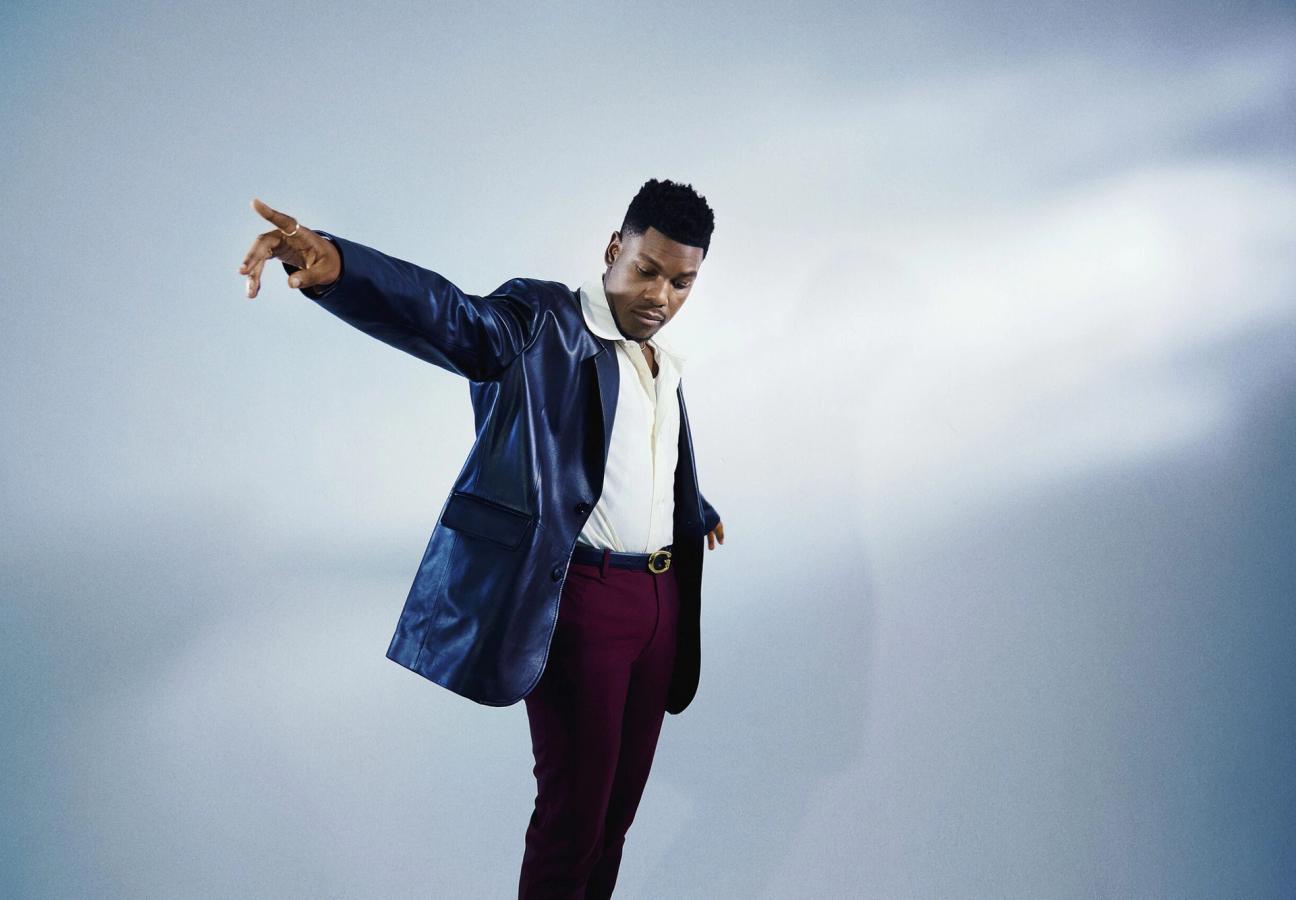
Gant Jacket, £700, Shirt, £140, Trousers, £160; M&S Vest, £24; Gucci Belt, £360; Cernucci Necklace, £25; Bleue Burnham Ring, £975; Chained & Able Ring, £95; Vacheron Constantin Watch, £POA
“So, for me, that was definitely the first movie that showed it was possible — and not just as a black actor, but as a black British actor; not American. Because we couldn’t even imagine what it would be like working over in the United States, or being included in that industry. We were homegrown, and deciding what sort of projects we should be involved in. So Kidulthood was important. It was high-end, it looked like it had enough of a budget to tell its story well. And the actors were incredible”.
Boyega considers many of the actors from the ‘The Hood Trilogy’ to be his earliest industry inspirations. From Aml Ameen to Adam Deacon — as well as Ashley Walters, who started as the titular Bullet Boy in 2004 — the actor says that his own peer group owes much to this first wave of black British artists.
“Daniel Kaluuya, also,” he adds, “I had been a fan of his for a very long time. And all of those actors, who were in the first fresh British films, they definitely motivated a generation of people”.
Boyega, too, came up alongside a wealth of now-successful actors, mostly graduates of the Identity School of Acting in Hackney. Both Damson Idris and Malachi Kirby attended the college, and Boyega shared classes with Black Panther and Black Mirror star Letitia Wright.
“We’re obviously not part of any monarchy!”
“Yeah, I came up with Letitia in drama school,” the actor says, but adds that he and his fellow graduates wouldn’t consider themselves a ‘group’. “I don’t know. I know a set of people, and I sometimes feel as though I don’t know enough people. So, while it’s not like an organised group, our paths do cross and it’s like, bloody hell, we have come far”.
Boyega, arguably, has come further than most. His impressive résumé can be divided largely into two schools of work: fantastical franchise jobs, such his central role in the Star Wars sequel trilogy, and the big budget Pacific Rim: Uprising; and powerful character studies of historical icons who find themselves thrown into an environment of racial injustice. This could be Melvin Dismukes, the persecuted private security guard at the centre of Kathryn Bigelow’s Detroit, or Leroy Logan, the founding member of the Black Police Association and focus of the third film in Steve McQueen’s acclaimed Small Axe anthology. Before being cast in 2015’s Star Wars: The Force Awakens, Boyega was even attached to biographical drama Race, in which he was to star as renowned American athlete Jesse Owens.
But a galaxy far, far away beckoned, and the actor’s cosmic leap to superstardom — as Stormtrooper-turned-resistance fighter ‘Finn’ — went on to earn him the BAFTA Rising Star Award in 2016, and the Trophée Chopard at the 2016 Cannes Film Festival. Boyega worked on the space-faring franchise for three films, wrapping in 2019 with The Rise of Skywalker. The actor has since criticised this third instalment, alleging that his once-lead character was “pushed to the side” along with those played by actors of Central American and Southeast Asian descent.
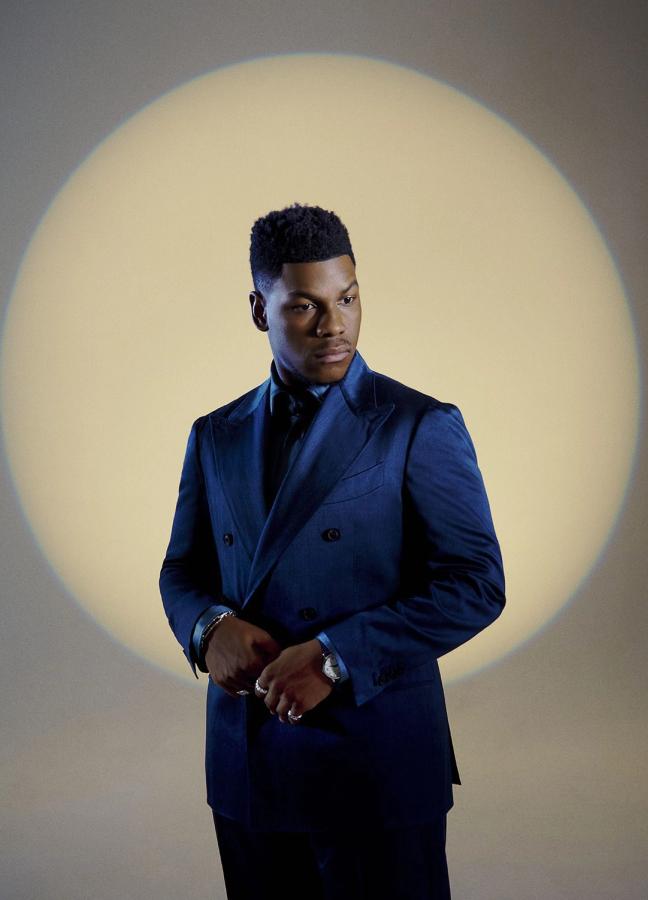
Canali Suit, £1,870; Tom Ford Shirt, £740; Tiffany & Co Bracelet, £1,300, Ring, £2,600; Hatton Labs Ring, £160; Chopard 40mm XP Watch, £8,110
Since then, Boyega has been off the big screen for three years — save for black comedy Naked Singularity, which was given a limited cinematic release overseas last year. But he’s been busy and, as we speak, the actor is promoting a trio of diverse projects, all released in the space of four months. The most epic of these is The Woman King, the heightened yet ultimately true tale of West Africa’s all-female ‘Agojie’ regiment, starring Viola Davis as its intimidating lead. In the film, Boyega lives up to his noble name; cast as the reformative Ghezo, King of Dahomey.
“They approached me for it,” recalls Boyega, “but, in all honesty, I’m not sure they thought I was going to go for it. We asked why, and they said that it wasn’t the lead, and I mostly do films where I’m the central character. But Gina [Prince-Bythewood, the film’s director] wrote me this amazing letter, and spoke about what they wanted to do with the project — and the importance of projects like this. Knowing my advocacy, specifically for black women in our industry, and the disparity of opportunity, we knew that adding my name to the project would also help get it made, and seen.
“So, after reading the script, it really just all aligned for me creatively. It felt like a good enough role. And it was a few weeks in South Africa! So I said definitely, I was down to do it. It felt like a call to action in a sense”.
It was the first time Boyega had visited South Africa — although he has since been back, several times, to explore cities from Johannesburg to Cape Town and Durban. When travelling to any African nation, Boyega says, he uses his Nigerian passport. “A lot of people think that I’m 100% British,” he adds. “But I’m not. I’m a dual citizen”.
Before the pandemic, Boyega would take a trip to Nigeria once a year, where he maintains a home. But, with his punishing work schedule and the various international lockdowns, the actor hasn’t found the time to visit in almost two years. Later this week, he will right that oversight — and he couldn’t be more excited. What’s the first thing he’ll do when he lands? “Go eat”.
“But I’d never ventured out of Nigeria, really,” says Boyega, of his time filming The Woman King. “And, for a long time, I’d had no experience of the southern region of Africa at all. So it was nice to go out there with work. It was a really good time”.
Dolce & Gabbana Coat, £1,100, Blazer £2,800, Trousers, £650; Kingsman by Turnbull & Asser Shirt, £360; Lanvin Bow Tie, £130
Hawes & Curtis Cufflinks & Dress Studs, £49; Louboutin Shoes, £750; Tiffany & Co Bracelet, £1,300, Ring, £2,600; Rolex Watch, £50,850
The Woman King ends with an anthemic address given by Boyega’s King Ghezo. It’s a speech that swirls together sentiments of power, oppression and bravery, and the sequence has been hailed by many critics as one of the film’s best. But the actor’s portrayal of the monarch, while undeniably formidable, also exhibits an oddly gentle quality. It’s a firm-but-unflustered composure that seems similar to Boyega’s own — although the actor might disagree with that.
“No, not at all,” says Boyega of the comparison. “Ghezo had a much more complicated rise to his position, being that it happened through a bloody coup. Although I suppose maybe I can see the parallels in someone young, or in terms of what the world sees as young, having such big responsibilities.
“What really made this character interesting,” he adds, “and why it appealed to me, was that he was so different from me. I tend to specifically go for characters that are very different from me — and each other. If you put my character in The Woman King next to my character in Breaking, there’s a significant difference”.
Breaking, another true-life tale, shows Boyega as we’ve never seen him before. The film tells the story of a 2017 hostage situation in a Wells Fargo bank, and the actor’s leading turn as Marine Corps veteran Brian Brown-Easley is as transformative as it is traumatic. The ex-soldier, compelled into action over $892 he was owed by the Veterans Administration, had a shaved head, a nervous disposition and a husky whisper. Boyega is almost indistinguishable from him. On YouTube, underneath the film’s trailer, comments snap between those who didn’t even recognise Boyega initially, and those eagerly praising his acting ability. One even dubs him “the next Sidney Poitier or Denzel Washington”. It’s a performance that, once watched, will leave you inclined to agree.
“Actors, man!” says Boyega. “That’s what we do. Innately, as an actor, you must have this skill of perspective — an ability to project and embody. You must be able to bring all these emotions that normal people need certain situations to bring to the surface.
“So, in doing the research and reading for the role, I saw that Brian was very softly spoken. I saw that in the CCTV footage, and the voicemails and voice notes that we had access to. And it’s all about having respect for the character, but also knowing that Brian has surviving next of kin and family who are going to watch the film. So if I’m always shouting and using the deepest octave of my voice, they’ll just be like: ‘That wasn’t Brian’. So you have to get it right, out of respect for him”.
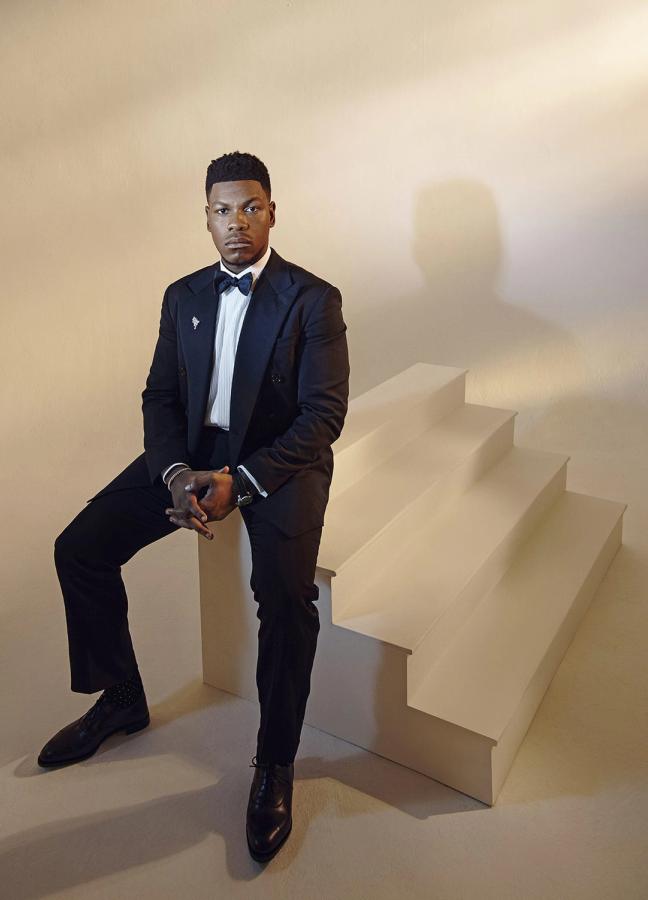
Ralph Lauren Suit, £2,750, Shirt, £405, Bow Tie, £140; Edward Green Shoes, £995; London Sock Co Socks, £14; Cartier Broach, £30,500, Cufflinks, £440, Bracelet, £8,450, Ring, £3,200; Chopard L.U.C XP 40mm watch, £8,110
Building a career suffused with biographical roles, Boyega has met these delicate, dramatic demands time and again. The Guardian’s film critic, Mark Kermode, even echoed those earlier Denzel Washington comparisons in his review for Detroit. “There’s something of the young Denzel Washington in Boyega’s physicality,” Kermode observed, “the ability to convey both strength and vulnerability through the tiniest facial gestures”. Last year, in praise of Boyega’s Small Axe turn, Kermode’s fellow Guardian critic, Peter Bradshaw, called his performance “comparable to Al Pacino in Serpico”. This opinion was shared by several awards bodies; amongst other gongs, Boyega scooped up a Golden Globe for the portrayal. But how heavy does the responsibility of playing so many real-life people weigh on Boyega?
“I mean, it is a responsibility,” reasons the actor. “But it’s more of a responsibility to the art. Because, if you’re portraying somebody who lived, acting requires you to do the research, and get to know every aspect of that individual. So, when the audience does come in — and we all have access to the truth now — no-one is left thinking: ‘Bloody hell! What was that?’. It’s a devotion to your art and your skillset. Because, these days, people can literally get their phones out and compare while the film’s going on, so it’s very important to get at least the main accuracies of the character right, before collaborating with whoever your director is for the wider vision”.
"Innately, as an actor, you must have this skill of perspective…”
Boyega clearly values strength of character on-screen. But he also values this same resolve and purpose in his personal life. During Britain’s Black Lives Matter rallies in June 2020, Boyega brought his passion and pain to a stage in London’s Hyde Park; his beliefs and convictions writ just as large in under five moving minutes as they have been even in his most affecting feature-length films. He spoke of peace and power, of lives cut short and promise not met. He became a beacon of the movement.
But Boyega has never been one to back down. If the actor sees something a certain way, he’ll call it. Five years ago, when he was 25-years-old, a newspaper journalist asked Boyega what he considered his biggest character failing. “The way I react to certain things,” he answered. “Sometimes somebody has a point, and I don’t have time, and I’m like, ‘What are you saying? Get straight to the point.’ I’m very direct and sometimes you have to realise people aren’t always like you.”
In the years since, Boyega has established his own production company, UpperRoom, he has become a patron of the Los Angeles branch of his alma mater, the Identity School of Acting, and he has partnered with anti-violence youth charity, the Damilola Taylor Trust. But does he still consider himself to have the same ‘character failing’? Or have things changed?
“Certain things have,” Boyega says, hesitantly, “but then certain things haven’t. Because I’ve realised that it’s not always me who has to change. Sometimes, it’s other people. People who beat around the bush, you know? If there’s something you want to say, just say it.
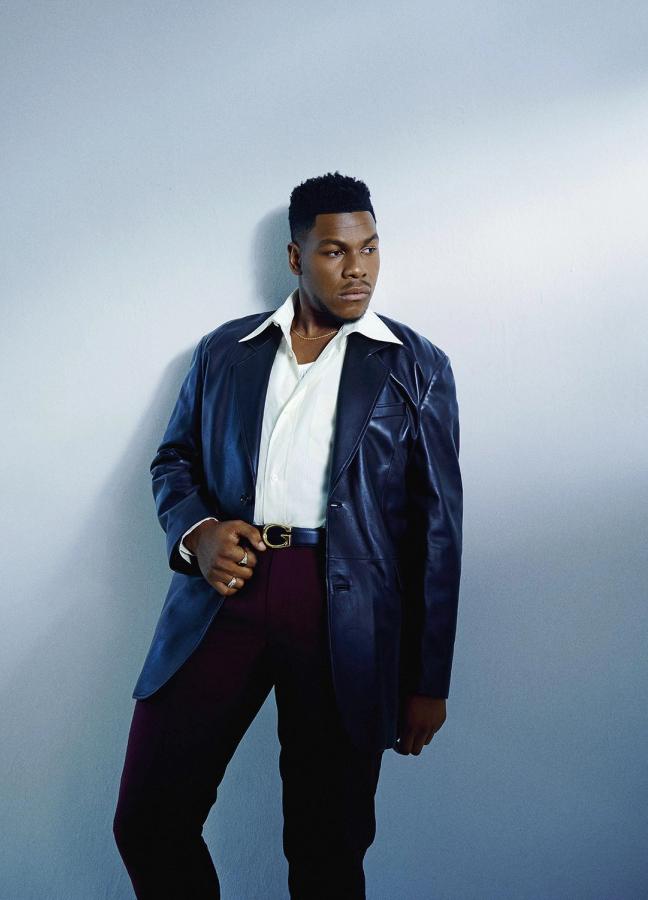
Gant Jacket, £700, Shirt, £140, Trousers, £160; M&S Vest, £24; Gucci Belt, £360; Cernucci Necklace, £25; Bleue Burnham Ring, £975; Chained & Able Ring, £95; Vacheron Constantin Watch, £POA
“On the flip side,“ he adds, “there is a responsibility for me now, and I must have more patience, and more understanding. In my position, the truth can be far removed from you. People look at the money and the fame, and it makes them not want to say this, or say that. And I can’t really relate to people who do that — people who try to make conversation comfortable for other people’s egos. Just tell me the truth, that’s what makes me comfortable. Because at least I know what’s going on. But, of course, in asking for that, I also need to manoeuvre things with a little more patience”.
Self-awareness, Boyega believes, is the key to living well. “That way, you’re only making compromises in the right moments. It’s about knowing when it’s your time to say: ‘Okay, they’re right. Their perspective needs to be listened to and I need to chill’. But there are still moments when other people are wrong, guys! And those moments are when I’ll thrive — and correct your arse!”.
Boyega’s readiness to put people right is refreshing. It’s a particularly plucky attitude in a world where, as the actor himself says, people are constantly trying “to make the conversation comfortable”. But, with Boyega, you at least know where you stand. If something rubs him the wrong way — whether that be your wider socio-political sentiments or a pair of particularly lurid loafers we suggest he slip on — he will let you know how he feels. The actor is distinct, definitive; a clear-cut, no-nonsense voice in a world shrouded and clouded with caution. And, with every passing year, he says that increased hindsight and experience only strengthens his straight-talking temperament.
“It really does,” says the actor. “Because, sometimes, as a society, we just don’t give each other enough patience or grace to be human, learn a lesson, and not be judged for it. Obviously there are certain lessons you don’t want to be learning, but in terms of general growth, we do need to evolve a bit”.
Which brings us back, in a roundabout way, to Boyega’s body of work. Because this, too, has evolved over time — transforming from a career built on vast, creatively constraining franchises to one spread thick with nonconformist fare; peculiar one-off projects from auteur directors, such as They Cloned Tyrone. Slated for release on Netflix, this pulpy caper co-stars Jamie Foxx, and is as much a mystery as the conspiracy at its story’s centre.
“It has, so far, remained mysterious,” smiles Boyega. “And respectfully so, for the director of the film, Juel Taylor. I play Tyrone, the title character, who’s been cloned and he’s going through a situation in which he has to gang up with a prostitute and a drug dealer. So they’re kind of this weird trio of people, who you wouldn’t usually expect to see in a mystery story like this. But they have to track everything and figure things out. For me, it was a much more serious, much more stern role — I play the dry guy against Jamie Foxx’s extroverted comedy and Teyonah Parris’ great timing. But it was a really fun project”.
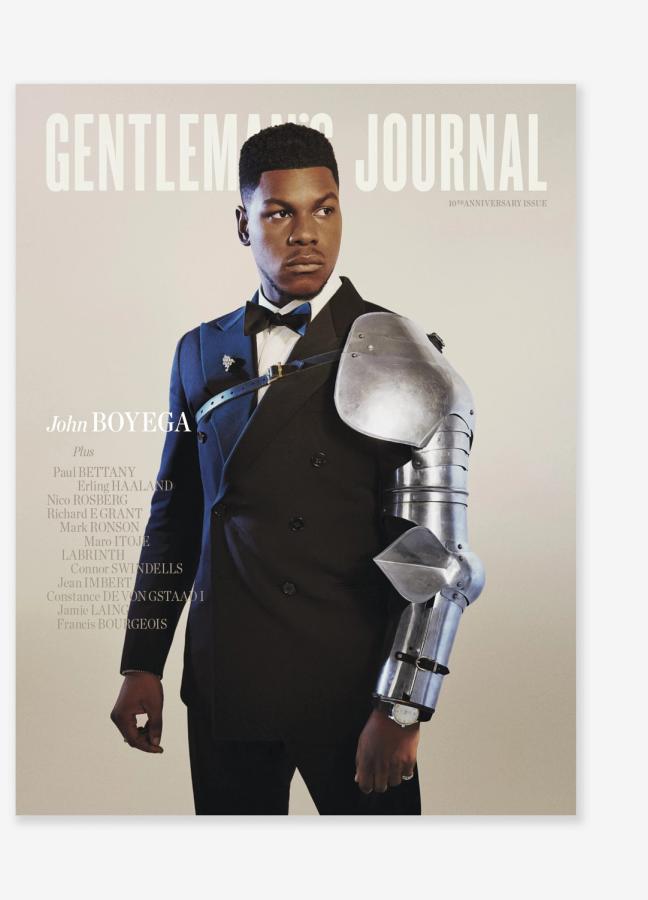
Part of this fun, Boyega says, was getting the chance to work alongside an industry heavyweight like Foxx. “He’s just been part of the culture for such a long time. So I knew it was going to be a laugh. Jamie Foxx, I’d say, is the cool uncle that everybody needs. That’s how I knew, going in, that it was going to be a good kind of vibe”.
With his production company inking partnership deals with both Netflix and Paramount Global, those good times look set to roll on. Boyega plans to spend the next few months — including a festive period with his family in London — relaxing and reading scripts for the potential projects to tackle in the new year. But beyond that, what lies ahead? Has Boyega set himself any specific goals or targets for the second decade of his career?
“At this stage, I’m not thinking about that,” he says. “Before now, I was thinking about that, and I made a ten year plan for my twenties. And that worked, don’t get me wrong. But now, I think I’d much rather just chill and relax and actually see what I want moving forward. And that’s changed. During the last decade, what I want has changed”.
Once again, spoken with the same straight-talking, high-sounding verve and vision of a man on a mission. And that’s the final kingly comparison to draw between the actor and the noblemen from which his Yoruba names derive; Boyega, like any lionhearted leader, is never one to follow in anyone’s footsteps.
“So what I really want,” announces the actor, “is for my films to feel like an event. Like how the old movies used to feel. I want them to have something to say. So, going forward, I’m going to recalibrate the way I work, and just see what a different kind of approach can do”.
Want to see more of our 10th Anniversary special? Here’s a sneak preview of the latest issue…
Sign up today and enjoy 25% off your subscription with code GJANNIVERSARY10. Click here…


